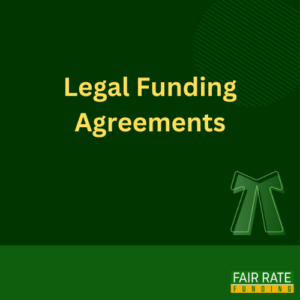Repaying Lawsuit Loans
Plaintiffs who are interested in lawsuit loans as a liquidity solution often ask how lawsuit loans are repaid. The answer is pretty simple and straightforward. But there are some important things you need to know. In this post, we examine how lawsuit loans are repaid, under what circumstances it is necessary, and what steps are involved. Understanding the repayment process is key before securing this legal funding.
What Is a Lawsuit Loan?

Lawsuit loans, also known as pre-settlement funding or legal funding, are specialty financial transactions where plaintiffs sell a portion of their future lawsuit recovery to “lawsuit lenders”. They offer immediate cash to plaintiffs who find themselves financially strained for a variety of reasons. Lawsuit loans are popular because they provide immediate access to cash to pay for any type of expenditure. Legal funding is most often used to pay:
- living expenses
- medical treatment
- past due accounts
- rent or housing costs
- and more.
Lawsuit loans are often provided within 24 hours, making them even more attractive to plaintiffs with immediate financial concerns.
Repaying Lawsuit Loans Depends Upon Contract Structure
Pre-settlement funding is unique in the sense that lawsuit loans are repaid only when the lawsuit results in a successful recovery. That is, if the lawsuit is lost, no repayment is required. For this reason, lawsuit loans are considered a “risk free” proposition for plaintiffs.
Contrasting lawsuit loans and personal loans boils down to when repayment is necessary. Personal loans imply repayment occur at some point in the future. Lawsuit loans however, are only repaid upon a recovery. Lawsuit loans are non-recourse, meaning lawsuit loan companies cannot pursue plaintiffs personally for repayment. Repayment is entirely dependent upon a lawsuit’s success.
The Lawsuit Loan Process
The lawsuit loan process is fairly simple. First, plaintiffs contact lawsuit lenders and apply for funding. Lenders then contact plaintiffs’ attorneys and request supporting documents. These documents are analyzed by lawsuit funding underwriters who will either approve or deny the request. When approved, lenders prepare a contract for signature by both the plaintiff and their counsel. Once executed and returned, the case is “funded” and money is sent via overnight courier or overnight transfer (EFT).
When Lawsuit Loans are Repaid
Lawsuit loans are repaid only after a case ends. This can happen through a court judgment, arbitration, or—most commonly—a settlement. Once the attorney receives the funds, they will deduct the lawsuit loan amount (plus fees and interest) before disbursing the remaining settlement to the client.
How the Repayment Process Works
Lawsuit loans are repaid summarily as follows:
- Settlement or Judgment: Your case concludes, and a settlement or award is issued.
- Attorney Receives Funds: The defendant or insurance company sends the settlement check to your lawyer.
- Attorney Deposits Funds: The attorney deposits the proceeds into an attorney trust account.
- Loan Payoff: Your attorney pays the lawsuit funding company directly from the settlement.
- Lien Payoff: The attorney pays off any other liens on the file. This often includes an attorney’s fee.
- Remainder to Client: After the loan and legal fees are paid, the remaining funds are released to the client.
What Costs Are Involved?
Lawsuit loan cost remains a major concern for most individuals considering legal funding as a financial solution. Lawsuit loans are repaid in amounts which calculate the following:
- The original advance amount (amount client receives).
- An interest rate, which can be either simple or compounded monthly.
- Any processing, origination fees, and/or other fees.
Lawsuit loans are repaid generally according to a schedule which calculates the payoff depending upon how long it takes to resolve the case. Lawsuit loan best practices place this schedule on the first page of the contract. Accordingly, clients wishing to pursue funding would be wise to review the funding agreement carefully.
If You Have Any Questions, Call 888-964-2224
WE ARE HERE TO HELP YOU!
Can You Pay Back Early?
Lawsuit loans are repaid at the conclusion of the case. However, most lawsuit loan companies allow early repayment without penalties. This more often occurs when a plaintiff wishes to secure multiple lawsuit loans and another lender “pays off” the previous advance. This is so there is only one funding agreement attached to a case at any given time. This is preferred by most lenders but exceptions sometimes occur.
Most funding companies also allow plaintiffs themselves to repay the advance. This is more rare than what is described above but is still possible. If a case is moving faster than expected or a plaintiff comes into funds, they can ask the lawsuit lender if early repayment is an option.
What Happens If You Lose Your Case?
Remember, lawsuit loans are NOT repaid if the case is lost (no recovery). This is a main feature. Because these are non-recourse loans, you are not personally liable if your case doesn’t result in a settlement or award. You don’t need to repay the loan if there’s no recovery.
Final Thoughts
Lawsuit loans can provide essential financial support during a difficult time, but it’s crucial to understand how lawsuit loans are repaid before committing. Always read the terms, consult your attorney, and work with a reputable funding company. This is the primary reason why the Fair Rate Funding blog is so popular among our clients. Everything you need to know about lawsuit funding can be found on this website.
Why Choose Fair Rate Funding
You obviously have a choice in who you use for legal funding. We offer:
- Simple and Easy Process – Approval only on the strength of your case.
- Risk – Free Proposition – Only repay if you win your case.
- Rapid Approval and Funding – Approvals often within 24 hrs.
- Up Front Pricing – Absolutely no hidden fees.
Give us a call and learn about your options. We are here to help and are at your service.







